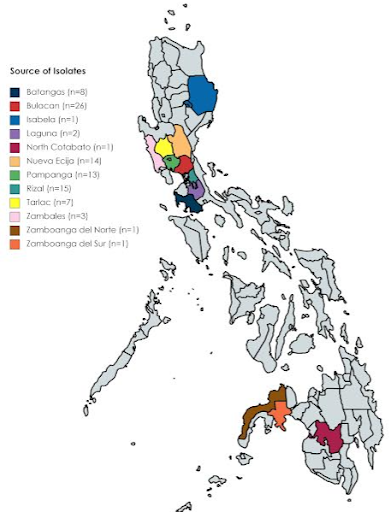Safeguarding Food and Public Health: NMIS' Commitment and a Call to Collaborative Action Against AMR
As part of the Department of Agriculture’s nationwide strategy to combat Antimicrobial Resistance (AMR), the National Meat Inspection Service (NMIS) remains at the forefront of detecting, monitoring, and managing resistant pathogens throughout the meat production and distribution chain.
Pathogen surveillance has continuously been a critical component in NMIS’ mandate. In 2016, with the adoption of the Philippine AMR Surveillance Framework for the animal sector, AMR Surveillance was formally institutionalized. Since then, NMIS has routinely collected and analyzed bacterial isolates from healthy livestock—particularly pigs and poultry intended for human consumption—to track resistance trends and develop effective actions.
Recognizing AMR as a dynamic global threat, NMIS seeks to address systemic gaps in AMR management through evidence-based science, continuous capacity-building, and research collaborations with both local and international partners.
In 2022, NMIS conducted a joint study with the UK Animal and Plant Health Agency (UK-APHA), titled “Assessing AMR in Animals at Slaughter in the Philippines,” which used whole-genome sequencing and antibiotic-susceptibility test to analyse E. coli and Salmonella in healthy animals for slaughter. Research showed that Salmonella isolates collected from various regions in the Philippines (Fig. 1) included several serotypes—most commonly Enteritidis, Infantis, monophasic Typhimurium, and Typhimurium—while Kentucky, Adelaide, and monophasic Typhimurium showed multidrug-resistant (MDR) profiles. These findings align with the AMR trends reported by other local and regional studies.
Effective mitigation of AMR in the Philippines is a shared responsibility. NMIS urges stakeholders to participate and take immediate action:
- Producers & Veterinarians: Practice good husbandry and biosecurity practices, maintain accurate treatment records, and use antibiotics strictly under veterinary prescription.
- Academia & Research Institutions: Partner with NMIS to fill surveillance gaps, develop rapid diagnostics, and evaluate alternative interventions.
- Local Government Units & Policy-Makers: Enforce veterinary-drug regulations, invest in laboratory capacity, and champion One Health initiatives in your jurisdictions.
- Development Partners & Donors: Support capacity-building, technology transfer, and community-based education projects that foster responsible antimicrobial stewardship.
- Consumers & Retailers: Choose meat from NMIS and LGU licensed meat establishments, observe proper cooking temperatures, and practice safe food handling to prevent cross-contamination.
Every year, NMIS celebrates and joins the World Antimicrobial Awareness Week (WAAW) campaign to raise public awareness and strengthen the national movement against AMR. The agency encourages all sectors to take part in this initiative to promote responsible antimicrobial use across human, animal, and environmental health.
Together, through coordinated multisectoral action and steadfast commitment to a One Health approach, we can preserve the effectiveness of life-saving antimicrobials and ensure a safe, high-quality meat supply for every Filipino. Join NMIS in turning these priorities into real progress—because the fight against AMR begins with all of us.
Tayo ay sama-samang magtulungan upang antimicrobial resistance ay mapigilan: Makialam. Manghikayat. Agarang Kilos. #iAMResponsible #EducateAdvocateActNow #SafeMeatforAll



